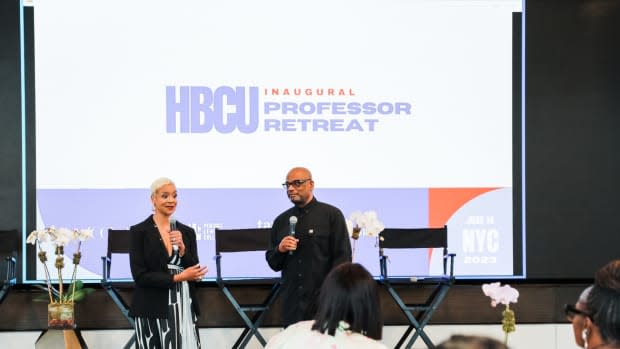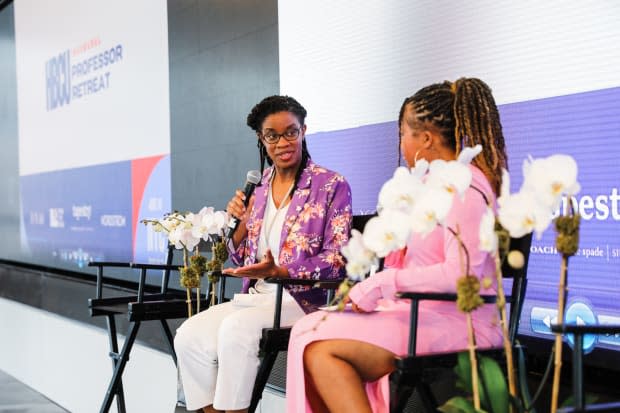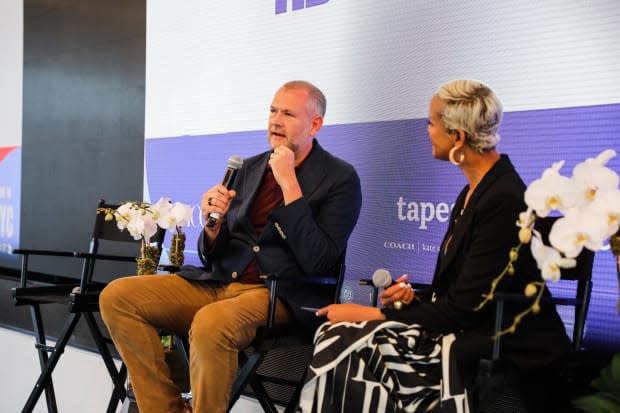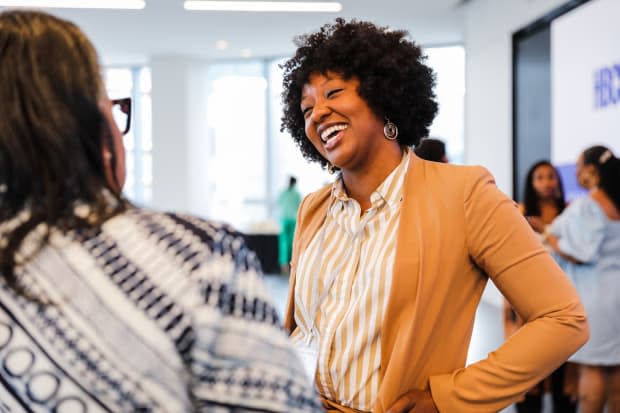What HBCUs Need From the Fashion Industry Right Now
- Oops!Something went wrong.Please try again later.

Photo: Courtesy of Harlem's Fashion Row
Professors from Historically Black Colleges and Universities (HBCUs) and executives from the likes of Nordstrom and Ralph Lauren gathered in New York City on Wednesday at a summit hosted by Harlem's Fashion Row to discuss talent pipelines, teaching, opportunities in fashion and more. One topic stood out the most, though: what HBCUs need from the industry right now.
HBCUs struggle with a lack of federal funding, mirroring systemic racism in institutions across the country, which trickle down into individual departments and programs. Recent partnerships with fashion companies have offered some solutions: Kate Spade New York, for example, has been an active partner with Bowie State University, hosting fire side chats, design talks and preparing students for the job search; Ralph Lauren, for its part, has worked with Morehouse and Spelman students on product collaborations. Still, educators are thinking bigger.
"Our job is not to get students to graduate — it's to get them to their dreams," said Bowie State University Professor Danielle Brown. "I ask them at the start of every semester: What do you want to be when you grow up? And I give exposure throughout the semester and check back in."
Culture journalist D'Shonda Brown spoke about how her experience at Spelman built her confidence and prepared her for success in the media industry, regardless of how employers may perceive applicants with degrees from HBCUs: "They're so much more than just Black kids going to Black schools."
Fashion programs at HBCUs are improving, thanks to these kinds of partnerships with industry stakeholders, such as Harlem's Fashion Row and corporate sponsors, like Kate Spade New York parent company Tapestry. They need to be working in lock step, though, to truly invest in fashion's next generation of Black talent.
"I can't leave you where you are now — I need to take you with me," North Carolina A&T Professor Dr. Devona Dixon said of her mentality with their students. Like many professors in the room, she aims to be the kind of teacher that can change the course of a student's life and career.
Throughout the summit, educators revealed the resources and changes that would help support their fashion-focused students, including calls to action for those in the industry with the resources to make their goals a reality. Read on for the key takeaways.
Modernize hiring requirements for educators

Photo: Courtesy of Harlem's Fashion Row
Recruiters in other industries are vying to change requirements in order to hire people without degrees and focus on skills instead. Harlem's Fashion Row founder Brandice Daniel pointed to how this affects education, too: Most universities require masters degrees or a PhD in order to be considered for certain positions.
Pensole Lewis College's Dr. D'Wayne Edwards explained that needing to hire someone with extensive education and decades of experience leaves a very small pool of options, limiting who students can learn from. He himself was a footwear designer at Nike and Air Jordan before switching to education, and changed the requirements when he created Pensole to make teaching more accessible.
Create opportunities for industry learning

Photo: Courtesy of Harlem's Fashion Row
Speakers at the summit stressed the importance of direct collaboration between HBCUs and fashion companies — guest lectures, shadowing opportunities, internships, mentorship programs or certificates (like LVMH's luxury program) — which help both professors and students.
Dr. Dixon noted how there's no luxury fashion curriculum at NC A&T, but bringing in Tiffany & Co. staff on campus was helpful, as it offered her and her students an opportunity to better understand the luxury space and network with the team.
Dr. Edwards has leveraged these kinds of partnerships at Pensole to allow students to design shoes for the NBA's Detroit Pistons and attend masterclasses with Carhartt and New Balance. These, he said, have been instrumental in getting students competitive industry experience.
"I don't think we're going to get too far without each other," he said, offering the idea of also creating a fashion collective across HBCUs.
Professors also emphasized the importance of them having more opportunities for professional development and for working directly with fashion companies, to stay up to date in the industry. After all, Dr. Dixon said: "If you tell us, we'll tell them. If you prepare us, we'll better prepare them."
Make materials more accessible

Photo: Courtesy of Harlem's Fashion Row
The digital divide, which describes how varying levels of access to technology can drive inequality, affects HBCUs, too. And as the fashion industry becomes increasingly digital, it's important for students to have access to that technology to succeed — but pricey gadgets and software like CLO, a 3D fashion design tool, squeeze budgets that are already tight. This can have a domino affect and lessen students' career readiness.
These departments aren't just looking for partnerships within the fashion industry — they're also interested in working with tech companies to give students access to more tools. "Things that we do not have... if you have it, share it," Dr. Dixon said.
Never miss the latest fashion industry news. Sign up for the Fashionista daily newsletter.
